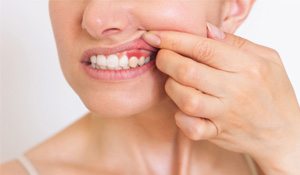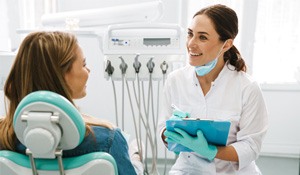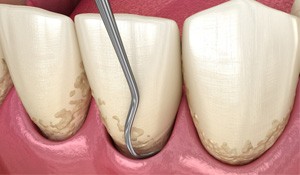Gum Disease Treatment for Wichita Falls
The Most Comprehensive Way to Replace Missing Teeth

At Strohman dental, we can make your smile whole again. If you’ve suffered tooth loss due to decay, gum disease, or injury, Dr. Shelley Strohman can help you achieve a permanent, beautiful smile with dental implants. Working closely with a dental implant specialist, Dr. Strohman will guide you through the procedure to rebuild your pearly whites from the roots up. Keep reading to learn more about dental implants in Wichita Falls or give us a call today to schedule your consultation.
 What is Gum Disease?
What is Gum Disease?
At its core, gum disease is an infection. What makes it so serious is that it can develop under the radar and, if it isn’t detected and treated right away, the minor symptoms can develop into painful, bacteria-filled pockets, receding gums, and even tooth loss. In fact, gum disease is the leading cause of tooth loss in adults 35 years and older! That’s why it’s so important that you come in every six months for a dental checkup and do your best to keep an eye out for warning signs of gum disease between visits.
 Symptoms of Gum Disease
Symptoms of Gum Disease
Between your biannual visits to our office, keep an eye out for these warning signs of gum disease:
- Gums that appear red or irritated
- Swollen, tender, or painful gums
- Persistent bad breath (even if you brush and floss)
- Loose teeth
- Gums that bleed often whenever you clean your teeth
If any of these arise, don’t wait – contact us ASAP to schedule an exam.
 How Do We Treat Gum Disease?
How Do We Treat Gum Disease?
When we’re able to catch your gum disease in its early stage (called gingivitis), it can usually be treated with dental cleanings at our office and more diligent oral hygiene at home (you should always be sure to brush where your teeth meet your gums). But, if it develops into its more advanced form, periodontitis, we may need to intervene with scaling and root planing.
Scaling & Root Planing

In short, scaling and root planing is like a dental cleaning specifically for your gums. Scaling involves using dental tools to gently clear away the built-up bacteria and plaque that is both above and below your gum line. Root planing, on the other hand, involves gently smoothing out the roots of your teeth so that you’ll have less of a chance of developing serious gum disease in the future.
Antibiotic Treatment

Of course, sometimes more than a single cleaning is needed to completely eliminate the infection. If that’s the case for you, then we may also choose to use antibiotic therapy to protect you from reinfection after the procedures are done. For the most serious cases of gum disease, we will refer you to a periodontist, which is a specialist solely focused on treating the gums. They may need to perform surgery to remove the infected tissue or a much less invasive procedure involving a special soft tissue laser.